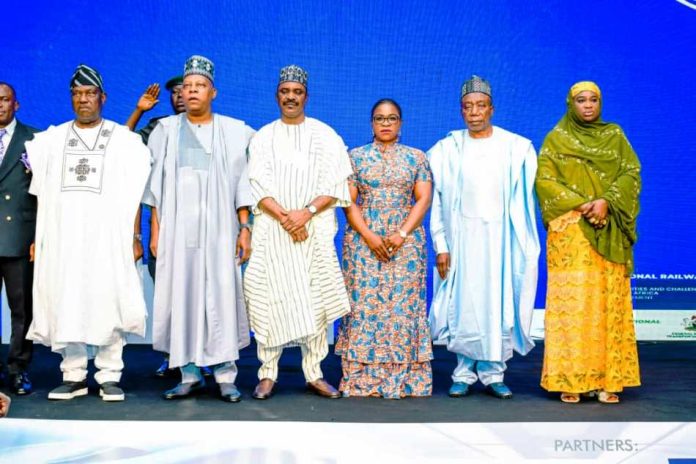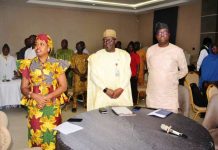
The Federal Government has said that the ongoing railway projects across the country are oriented towards addressing the adversities of population growth from the year 2050. This he noted underscores the need to lead Africa’s economic development.
President Tinubu made this known yesterday, 15th September, 2025, in Abuja at the second International Railway Conference with the theme: Opportunities and Challenges in Railway Development in Africa, stated that Nigeria today, more than at any point in our journey as a nation, is in great need of rail services for two compelling reasons. “The size of our economy and the scale of our population – 230 million people – is ageing towards 250 million. And by 2050, we will be the third most populous nation on earth.”
The President, represented by Vice President, Kashim Shettima GCON, stated that Nigeria is projected to surpass the United States and hit about 440 million people. While emphasizing the importance of rail transport services to the economy.
The President stated that, the world has remained committed to railway services because it has proven to be the backbone of industrialisation, connecting more materials to factories, workers to opportunities, and farmers to markets. Adding that, they shape not only economies, but also the cultural and social bonds of societies.
“This enduring relevance explains why every forward-looking nation, from China to Vietnam, across generations, has invested in the railways as a special driver of development.
“We cannot afford to lag if we seek to keep pace with global economic competitiveness. Thankfully, every part of this continent has embraced the reality of trains as a practical solution to our transportation challenges.
President Tinubu said he looked forward to Nigeria taking the lead in the railway system across Africa, saying: “The challenge ahead of us is to lead this race as the logistics hub of Africa. By reviving and revitalising our railway services, we must be conscious of our place as the anchor of West Africa’s economy and home to the continent’s largest population, as we prepare for the adoption of modern railway infrastructure.
“This awakening inspires projects, such as the Kano-Maradi railway modernisation, which opens new gateways for trade under the African Continental Free Trade Area.
“Our agenda is shaped by the need to reduce the burden on our roads and highways. Decades of over-reliance on road transportation have led to congestion, rapid deterioration of infrastructure, and higher accident rates. Railways offer safer and more environmentally friendly alternatives, reducing carbon emissions, and reinforcing our commitment to sustainable development.” He added.
According to him, connecting the country through rail requires collaboration with relevant stakeholders.
“The task of maximising the opportunities in the railway sector is not one we consider easy. It requires networks, partnerships, and robust collaboration with stakeholders. This is why our ongoing modernisation projects, Lagos to Kano, Kano to Maradi, and Port Harcourt to Maiduguri, are designed with open doors for private sector participation.”
He hinted that the Kano-Maradi rail project, which was at five per cent when the administration assumed office, is approaching 60 per cent completion.
Speaking earlier in a welcome address, the Minister of Transportation, Sen. Said A. Alkali stated that, the conference will maximize the potential of the railway sub-sector. He said the conference also seeks to assemble railway experts, industry players, and other Stakeholders to share knowledge and experiences across jurisdictions on emerging trends, funding opportunities, and prospects of railway services as a catalyst for national development.
“Successful facilitation of takeoff of the Federal University of Transportation Daura whose manpower status at the inception of the Administration had only a minimal staff, is now fully in session.
“The Administration also supported the operationalisation of the laudable Presidential initiative on compressed Natural Gas through the establishment of CNG Conversion Centres and training of over 6,000 transport professionals in 2024 alone by the Nigerian Institute of Transport Technology (NITT) Zaria to administer transport initiatives, laws, and policies.
It facilitated the provision of the Presidential transport festive relief programme across the country during the Yuletide, which transported over one million passengers free by rail and road in 2023 and 2024, respectively, to enhance the security and welfare of Nigerians.
The recent introduction of dual-fuel locomotive technology flagged off on the Abuja – Kaduna rail corridor to enhance operational cost effectiveness; Federal Government‘s financial support for the establishment of light rail by states beginning with Kaduna, Kano, and Ogun to enhance public transportation and economic productivity in the affected states and the country in general.
“The administration also attracted foreign investors for the construction of high-speed rail from Abuja – Lagos, Abuja – Kano, and Abuja – Port Harcourt to boost the nation’s infrastructural development and revenue generation profile. At the moment, the Outline Business Case was approved by the Infrastructure Concession and Regulatory Commission (ICRC); Facilitated sourcing of funds from China Development Bank and the release of the Federal Government’s counterpart funds for the Kaduna-Kano rail modernization project;
“The recent approval of the National Land Transport Policy by the Federal Executive Council after decades of struggle since 1993. The policy will lay the foundation for the future development of land transportation in Nigeria.”
The Minister, also observed that around the world, railways have always been more than a transport mode. “They are nation builders and Engines of Economic Transformation:
In Europe, railways enabled the Industrial Revolution.
In China, they powered urbanization and export growth.
In Africa, railways are emerging as the backbone of regional integration.
“To give credence to the foregoing reality, the railways development and services have been moved from the Exclusive list to the concurrent list through successful Constitutional Alteration.
This development will create opportunities for states and private sector participation to maximise the potential of railway transport as an enabler of economic growth and connector of regional hopes. He said.
“Let us envision a Nigeria where:
Our ports are seamlessly connected to factories by rail;
Our highways are relieved of endless trucks;
Our youth are employed building and running trains;
Our neighbours see Nigeria as the hub of African rail logistics.
“This is not a dream. It is a future within our grasp if we work together. Ladies and Gentlemen, the railway is the track of Nigeria’s future linking our economy, uniting our people, and securing our place in Africa and the world”.
In his presentation, major partner of the 2nd International Railway Conference and the Chief Executive Officer, De-Sadel Consortium, Samuel Uko commended the Federal Government for approving high speed rail project in the country.
He said that Nigeria would be the world`s second-largest high speed rail network at the completion of the project. This is even as he noted that the project would create two million direct and indirect jobs for the Nigerian public.
Signed
Janet McDickson Noah
Director, Information & PR





